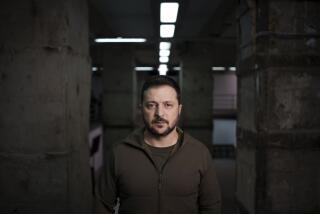Gorbachev Pushes Past Expectations, but Keeps Options Open
- Share via
Soviet leader Mikhail S. Gorbachev’s call for open and competitive elections for Communist Party positions is illustrative of the extent of the dramatic liberalization taking place in that country.
The Soviet Union is not about to turn into a Western-type democracy. There have been no changes in basic institutions or any weakening of party rule. But the changes in policies and practices and official attitudes are--by Soviet standards, at least--important and far-reaching.
Gorbachev has gone much further than many expected in his pursuit of glasnost , or openness. It is not only in some decentralization in economic controls, the release of Andrei D. Sakharov from internal exile and the permission for emigration extended to certain dissidents. It is particularly noticeable in the press. For the first time since Josef Stalin came to power, one can now see significant criticism and public debate.
How far will it go? Certain political prisoners have been freed, and there are reports that wholesale release is under way. Nothing yet has happened with regard to Jewish emigration, but even this can’t be ruled out.
Why all this? There are at least three reasons. One is that Gorbachev comes from a new reform-minded generation. A second is that he needs manifest popular support, among intellectual elites at least, for his drive against the bureaucracy. The third reason is of course propaganda, not only at home but also abroad.
The Soviets do things in a big way. There is a quite amazing Moscow meeting of 1,000 or more intellectuals from all over the world coming up this month--writers, lawyers, architects, physicists, doctors, etc. Several hundred invitations have been sent to Americans--including Edward Teller, the nuclear expert known for his anti-Soviet attitudes. Teller called the State Department to inquire what it was all about, and said that he would refuse to attend the Soviet gathering as long as Sakharov was kept in exile. The next day, coincidentally, Sakharov was released. Teller is still not going.
Is there a relationship between all this glasnost and foreign policy? Yes and no. The new Soviet developments obviously make inroads against extreme anti-Sovietism. But glasnost also includes new and more flexible foreign-policy positions. The most dramatic and important, I think, is the Soviet acceptance of President Reagan’s position of a “zero option” on intermediate-range missiles in Europe.
There is no doubt that Gorbachev wants arms-control agreements--again for three reasons: Soviet leaders are quite understandably frightened by the dangers of thermonuclear war; they need nuclear-arms agreements for internal economic purposes, and they are worried about a technological lag if the United States continues to experiment with the Strategic Defense Initiative.
In regard to nuclear-arms agreements, however, the real issue is testing--primarily the fact that continued testing creates the possibility of enlarged and enhanced nuclear arsenals. No matter how much Moscow may want “deep cuts” in intercontinental ballistic missiles, it will not agree to them unless the United States agrees at least to join in a moratorium on nuclear testing. And this is something that, it appears, the Reagan Administration will not do, now or in the future.
Among Soviet political elites, there are three points of view about how to deal with the United States: One is the present policy of continuing to make concessions in an effort to work out agreements with the present Administration. The second is that there is no hope of any agreements with Reagan and that the Soviets should mark time awaiting another President. The third is that the United States is irrevocably oriented to Cold War hostility and that any accommodation is impossible.
Gorbachev has opted for the first view. But if he continues to be rebuffed, or even if he perceives that he is being rebuffed, then how long will he hold this view? The selection of Alexander N. Yakovlev, the chief of the Central Committee’s propaganda department, as a candidate member of the Politburo and an advocate of the third, tougher, view indicates that he is keeping his options open.
There can be little doubt that the achievement of a major arms agreement would help consolidate Gorbachev’s position. But a failure in this regard could help undermine him. Former national-security adviser Zbigniew Brzezinski, with whom I seldom agree, thinks that Gorbachev may well fail in his domestic approach, and, if he does, there could be a return to more oppression--perhaps harsher than before. This certainly would be in the Russian tradition--to withdraw into the great Russian fastness and stifle all opposition. It could happen. I am inclined to doubt that it will, but it is clear that it is in the interest of the United States--and indeed of all humanity--to do everything that we can to help make sure that it doesn’t.
More to Read
Sign up for Essential California
The most important California stories and recommendations in your inbox every morning.
You may occasionally receive promotional content from the Los Angeles Times.









